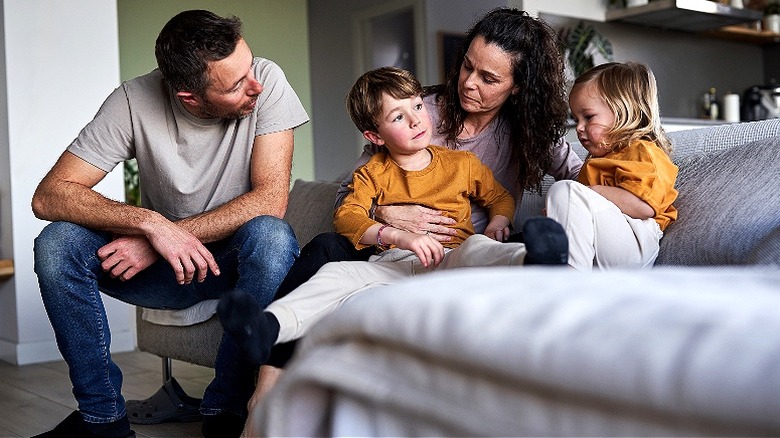How To Talk To Your Kids About Money
We may receive a commission on purchases made from links.
While financial literacy isn't as high as it should be in the U.S. (the World Economic Forum found that only 48% of U.S. adults would be considered financially literate in 2024), there is hope. As more states pass legislation mandating financial courses for high school students, future generations will hopefully possess better money knowledge. In the meantime, it can be important to talk to and teach your kids about the fundamentals of money as well as the economic system in which they live long before high school, even if knowing where to start feels overwhelming.
We spoke with David Delisle, personal finance expert and author of "The Golden Quest" about the best ways for parents to begin talking to their kids about money. According to Delisle, "We tend to make financial literacy over complicated when it doesn't need to be. When teaching our kids about money, the first and easiest thing we can do is to simply start talking about money and letting them know how much things cost." The best way can simply be to involve your kids in your everyday purchases.
"When you fill your car with gas or order food at a restaurant or visit the grocery store, you can let them know how much it cost. This is how they begin to understand the value of money," Delisle said. With that in mind, there are some key considerations for when and how to discuss money with your kids. Let's dive into two of the biggest questions parents may have when considering how to talk to their kids about money.
How old do kids need to be to discuss money?
One of the biggest questions you might have as a parent is when the right time is to introduce or educate your kids on new information like money. According to PBS News, kids can understand basic money concepts by age 3, and actually have many of their money habits already set by the time they're 7. So, while money might feel like an especially tricky subject, making sure the topic is introduced at the right time could be easier than you think.
David Delisle offered some simple advice, "As soon as your kids are old enough to ask you to buy them things, they are old enough to learn about money." (This can be especially useful down the line when it comes to negotiating any potential allowance you might give your kids.) Plus, by including the concept of money into interests your kids might already have, you can not only ensure a more seamless introduction of the subject but also have a better chance of comprehension.
"When my boys were really young, under 5, I would talk to them in terms of chocolate bars and Lego, because that's what they loved," Delisle went on to explain. "So, when they wanted something, I would put it in terms of chocolate bars or Lego sets. A teddy bear might be 10 chocolate bars, or a bike might be three large Lego sets. This was an easy way to start teaching them choice and what money could buy instead."
How much should kids know?
Another tricky question to navigate as a parent is just how much your kids should or shouldn't know about money, especially within a family's current financial situation. While those who are financially struggling might hope to shield their kids from the added stress of that knowledge, it may not be the best choice to leave kids in the dark.
As David Delisle explained, "As parents, we always know our children best, so this answer is going to be different for everyone and every situation. However, I tend to lean toward more information. If we don't talk about money, kids can't learn about money." He added that money conversations can be an important way for kids to learn that their parents are human, and even gain a greater empathy for what the family might be going through.
With that in mind, Delisle did warn, "Just be careful to let them know that they don't need to worry, and outline the different possible scenarios. For example, maybe as a family you decide to move to a smaller home to cut expenses."
He also offered an anecdote, "One of my favorite stories is from a young family that really wanted a new puppy but decided that sending their Mom to school was more important to them. If the children weren't involved in the decision, they might [...] not realize that there's choice and compromise when it comes to our finances." Ultimately, the right amount of knowledge comes down to what works for your family.


